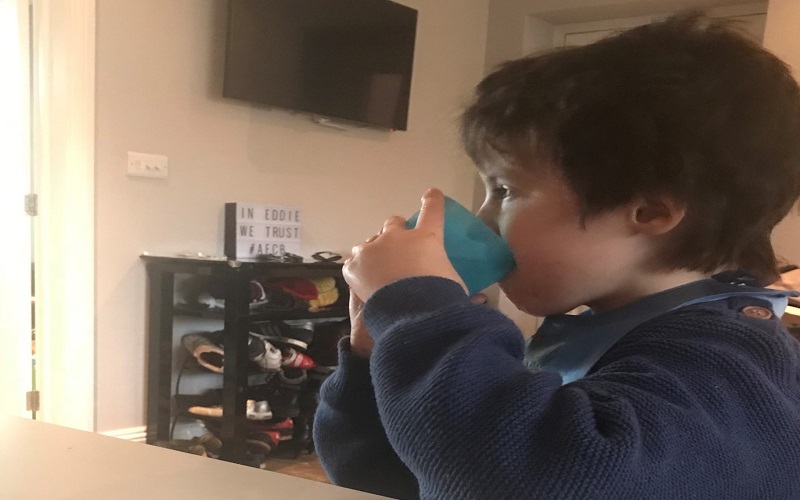One of the lesser known eating disorders is ARFID (avoidant/restrictive food intake disorder).
ARFID is a psychological disorder where the individual has clinically significant difficulties with eating or feeding.
The onset of ARFID is usually during a child’s infancy or early years, and is attributed to a number of circumstances.
Severe reflux during the new-born period can instigate bottle/breast refusal, as can a traumatic choking experience during weaning or early childhood.
Children with autism spectrum disorder may demonstrate sensory processing issues associated with certain colours, textures, tastes and smells.
Some neurological conditions can result in underdeveloped oral motor skills in young children and babies, resulting in eating and drinking being an unnatural and alien experience.
This was our story: Jenson was 13 months old when we learned of his neurological genetic disorder and by then the damage had been done.
But whatever the cause, the consequences of ARFID include a learned and instinctive behaviour towards food where the young person considers it to be a threat and therein instigates food refusal. It is akin to a phobia.
Sadly ARFID is largely unfamiliar among health professionals as a recognised mental health disorder, and it is dangerously un-resourced by our health authorities.
I have sat in front of many health professionals educating them on the subject; most have been eager to learn but some still box it with ‘picky eater’.
Where weight isn’t an issue, for example if a child is surviving on just chicken nuggets or potato waffles, parents are frequently told the child will ‘grow out of it’.
Parents are judged, sufferers are misunderstood. Consequences can be devastating.
Very sadly, the default care pathway for small children where weight gain is compromised is to place a feeding tube.
This is the equivalent of sticking band aid on a wound and leaving it untreated. Children who have tubes placed often relinquish their potential to eat forever.
At 2 and a half years old and with a dangerously low consumption of high calorie prescription formula, we were at our wits end with Jenson’s refusal of anything solid.
He was dancing dangerously close to dehydration and his contempt of all foods was not showing any sign of waning. It was a heart-breaking and gruelling couple of years which traumatised all of us.
When your child won’t feed from you, breast or bottle, or eat your prepared foods, the emotional onslaught as a mother is harrowing.
It was Jenson’s low muscular tone throughout his body that meant he had reduced oral-motor coordination.
His mouth sent messages to his brain that any spoonful or mouthful was a choking hazard: it was threatening his life. The brain responded by creating a barrier and feeding refusal was born.
We had exhausted all the well-meaning advice from speech and language therapists, occupational therapists, dieticians and paediatricians.
He was classified as ‘failure to thrive’ and gastrostomy surgery was scheduled.
It had been the most upsetting and traumatic few years, watching your child seemingly choose to starve themselves, and for no one to understand, never mind be able to help.
I accepted that a gastrostomy was inevitable but a small voice in me was shouting out that he deserved to learn to eat, that I must not just give up on this possibility.
As a last resort I trawled through Facebook groups. I found some expertise about ARFID and I can only describe it as an epiphany.
We challenged and campaigned our local NHS but were unsuccessful at being heard or understood.
However, we were fortunate enough to secure some private specialist help and an expert team to pave our way forward to bring Jenson closer to accepting food.
So today, at 5 years old, Jenson asked me for a cup of water, and then electively and independently fed it to himself. Only parents of children with ARFID will understand the magnitude of this event.
So I whipped out my phone, took a photo (see above!) and whipped out my laptop, and wrote this blog.
Jenson is now eating a range of foods but we still have a long way to go to counteract the underlying and widespread effect that his ARFID caused to his relationship with food and feeding.
ARFID is not picky eating. It is not bad parenting. The child won’t just eat when they’re hungry.
In fact, the feeling of hunger becomes so normalised to them that they can develop a permanently distorted and diminished appetite.
In ARFID, a sufferer’s brain will react pathologically to food akin to a diabetic reacting to sugar. They may gag, vomit, thrash out, cry. Therein lies the perpetuation of the no-eating cycle.
Health implications can be huge as a result of chronic malnutrition. But ARFID can also have widespread social, developmental and educational consequences.
Bullying, social isolation, dental decay due to severe oral sensitivities, traumatic school lunch breaks, families unable to dine out together.
Family bonding is often underpinned by the dinner time ritual and routine, but where this is interrupted by an ARFID sufferer the whole family is affected.
It is excruciating to watch and experience ARFID in its path of destruction.
I hope that this medically recognised mental health disorder can become more readily diagnosed and treated, and that the healthcare system can resource our health professionals so that children don’t have to suffer like Jenson did. #beateatingdisorders
I’d like to take this opportunity to thank the wonderful team of people who turned things around for us. Jenson’s feeding fairies:
Midland Psychology Specialist Feeding Service
Active Play Therapies
#tubetochicken
#martinmethod
